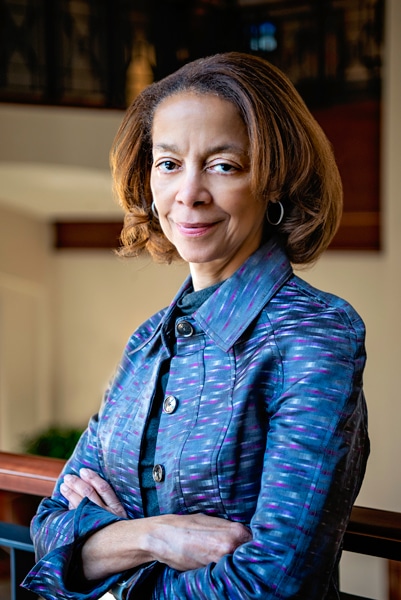|
Getting your Trinity Audio player ready...
|
When Susan Dunnings decided to leave her position as deputy general counsel at National Public Radio (NPR) after working there for a decade, she says, many around her couldn’t understand why she would leave. The focus on diversity at the esteemed news organization had been an inspiration to Dunnings, whose father had handled school desegregation cases for the NAACP early in his own law career. Dunnings herself had been part of a leadership transformation at NPR, one that included hiring a Black CEO and CHRO. The future of public radio was staked on the importance of diversity in the newsroom and the value that different voices “on air” provide in expanding a conversation.

Photo by Angela Bennett-Zoellner
Dunnings says that when she made the decision to join Lockheed Martin in 2007, she understood the questions from those in her circle. While it was one of the largest aerospace and defense companies in the world, the industry was not known for being particularly diverse at the time—quite the opposite, in fact.
As the vice president of employment/labor law and litigation at Lockheed Martin, Dunnings says that the diversity among senior leadership at the company was one reason she took the role.
“When I joined, there were four African American senior executive leaders, which signaled to me that it was a corporation which valued diverse perspectives at the table,” she says. “I believe we were able to lay the groundwork for difficult conversations many corporations have had to engage in with employees in the last year much earlier in our journey because of that commitment. I’m not going to say it’s been easy, but I think our record will show that this is a journey we’ve been on for quite some time.”
Committing to Wider Representation
Dunnings says that Lockheed Martin set a precedent for committing to diversity by creating a program to ensure that employees with disabilities were provided with meaningful accommodations and with opportunities for advancement. “I think Lockheed was able to become a thought leader in that space, and that program was a great place to start,” she explains.
And that was just the beginning. In partnership with the Lockheed Martin HR leadership team, Dunnings has advised on the strategy to reframe the company’s business resource groups. Along with groups for people of color, women, LGBTQ employees, veterans, and people with disabilities, there is also opportunity to participate as an ally to the groups, which allows employees at all levels of the organization to support Lockheed Martin’s broader commitment to diversity, inclusion, and belonging. Dunnings herself sits on the executive board for the Black Excellence Council at the company.
“When I joined, there were four African American senior executive leaders, which signaled to me that it was a corporation which valued diverse perspectives at the table.”
She also serves on the executive inclusion council (EIC), chaired by Lockheed’s CEO, which includes other executives from each business area of the company. “The EIC has oversight of our global diversity and inclusion strategic priorities across the enterprise while ensuring business culture and diversity strategy priorities align with the broader strategic goals at Lockheed,” she says.
When it comes to the outside counsel that Lockheed Martin retains, its general counsel, Maryanne Lavan, has led and supported efforts by Dunnings and others on the legal team to make representation a major focus. “I personally wanted to ensure that when we moved to a consolidated list of preferred firms to handle employment/labor litigation, the firms we considered for the program were willing to demonstrate their commitment to diversity and inclusion,” she says.
And when presented with the idea of creating a diversity assessment process for outside counsel by Lockheed Martin’s general counsel, Dunnings and a colleague met the challenge head-on. “With the support of two managers that did the heavy lifting developing the survey, we started surveying in 2015, and I can say that all firms invited to participate welcomed and embraced it,” she says. “We have received feedback that the survey process and our follow up each year has helped firms sharpen their commit to diversity and inclusion, not just as an idea but as a priority.”
Dunnings says representation is important with outside counsel, but equally important are the roles involved. “We are focused on consistently bringing a diverse set of lawyers to the forefront. Let them lead cases, let them be the face of your firm, let them be the future of your firm,” she says. Lockheed has even taken steps with its own legal internship program to partner with its outside firms to give young lawyers more experience in a corporate setting.
“People may sometimes downplay or be hesitant to share their perspective that it matters to see someone who looks like them in an organization, but I believe it does matter.”
The Value of Seeing Someone Who Looks Like You
Mentorship is an issue close to Dunnings’s heart. She still remembers the first time she came to Washington, DC, for the Lockheed Martin Black Excellence Council. “There weren’t a lot of people that looked like me at corporate headquarters when I joined,” she says. “I just remember walking into the annual conference and being overwhelmed with positivity and feeling part of something larger. I realize that people sometimes try and downplay the idea that it matters to see someone who looks like them in an organization, but I believe it does matter.”
At Lockheed Martin, that idea of mentorship has played out with partnerships and support for historically Black colleges, minority serving institutions, and STEM-focused organizations, on behalf of business resource groups and other parts of the organization.
More broadly, Dunnings encourages those starting out in their careers to find a role model in their organization. “It’s important to find the person who can help you understand the unspoken rules, because every organization has them,” she says. “For me, that person was the former Deputy General Counsel Scott MacKay. I tell people I’m not sure I would have stayed here had it not been for his open door, introductions to the leads of my new client group, and leadership commitment to my success right when I started.”
Dunnings also encourages younger lawyers to actively seek out informal mentoring, even if it’s just a single meeting. “People in leadership roles usually welcome the opportunity to talk to someone who’s looking to build their career,” she says. “Just find ways to stay connected to those who will support you in your journey.”
***
K&L Gates LLP:
“Susan is an innovative leader and delivers clear strategy when addressing complex, dynamic global challenges at Lockheed Martin. K&L Gates is a proud partner and celebrates Susan’s unwavering commitment to excellence and results.”
—Pallavi Mehta Wahi, Co-US Managing Partner


